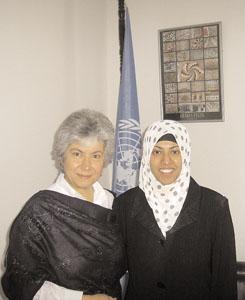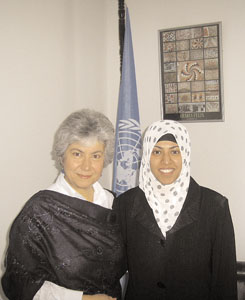
Former United Nations Resident Flavia Pansieri to Yemen Times:”Qat is holding Yemen back” [Archives:2008/1126/Reportage]
February 4 2008
 |
Q: What were the main priorities of the United Nations (UN) during the last three years and what will be its priorities for the next three years?
A: Every four years, the UN carries out the United Nations Development Assistance Framework (UNDAF), which is a document for the whole United Nations System; where we stand, what are the challenges, what is needed to done and what resources do we have. It does not address all the issues in the national plans because of limited resources, but the ones where we think that UN we can bring greatest added value. This has four basic pillars. The first one is:
– Promoting rule of law and good governance.
– Provision of the social services and needs.
– A program of economic wealth that creates employment and increases Gross Domestic Product (GDP).
– The area of women and gender equality.
The government is currently conducting a review of its plans, and we are happily supporting this.
Q: Will there be changes in the near future?
A: So for the future what I see is not a dramatic change in priorities but perhaps a greater drilling down on how to specifically engage in any one particular area.
Authorities often complain that there is little aid coming into Yemen, which I fully support and is right, but at the same time the relatively small donor community here is pretty cohesive and therefore able to leverage other strengths.
Q: ell us about the donor community in Yemen?
A: The donor community has a regular meeting every two months to see how best to improve our coherence.
Q: Has it been challenging for your work in a country like Yemen? How do you work out these challenges?
A: I think we are all keen to see Yemen change and progress. But this has to be change with stability. There is no country that the environment is not politicized. The challenges are there because the process of the country's development is through the negotiation between the country's different forces and powers. The essence of the democratic process is to have an open way to negotiate these differences in order to reach a consensus.
In essence, the UN is a change agent and we cannot come in and say, \”This is what you have to do.\”” The important thing is to gradually help people. It applies to corruption


